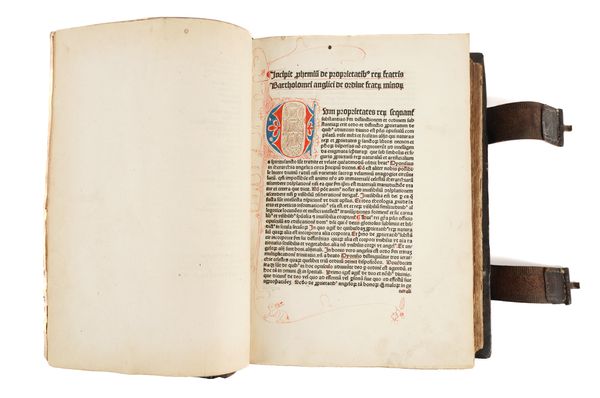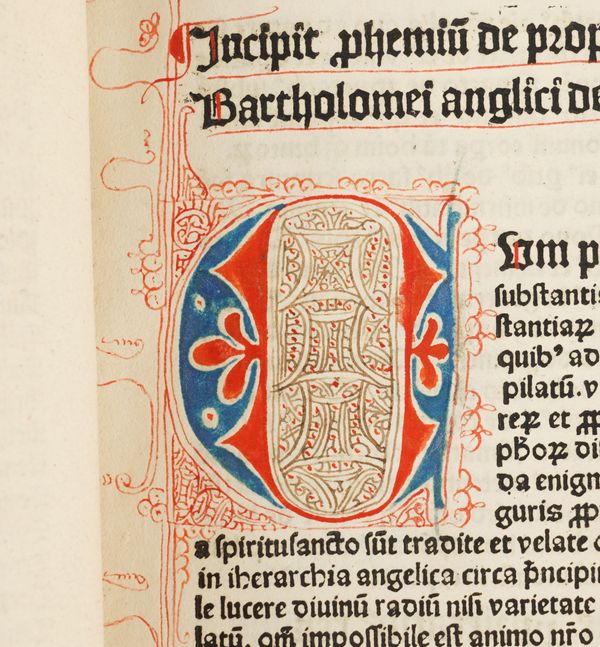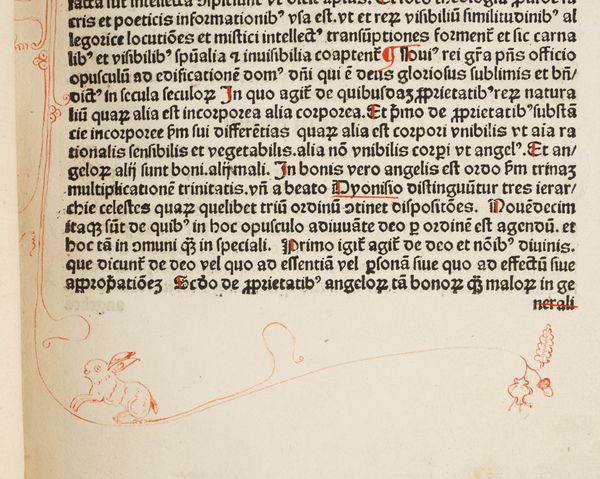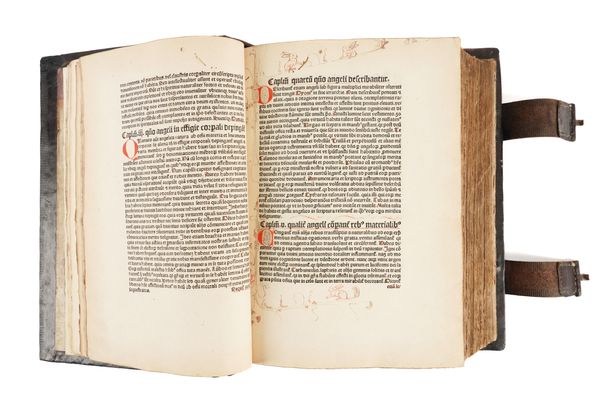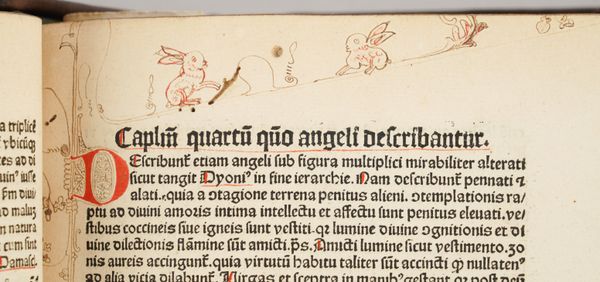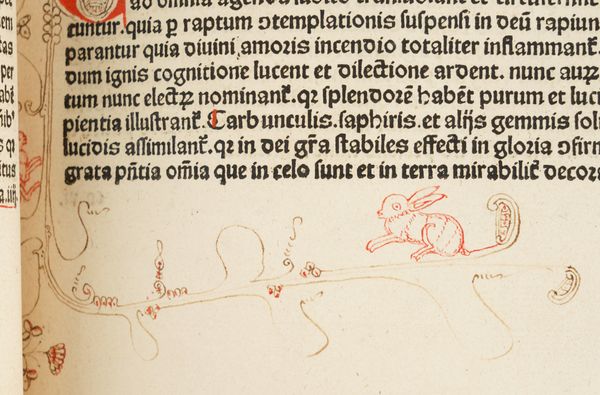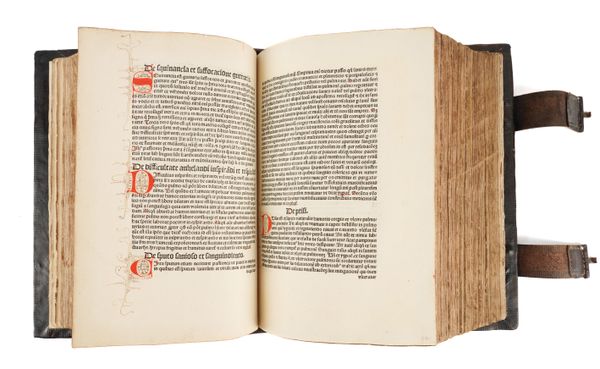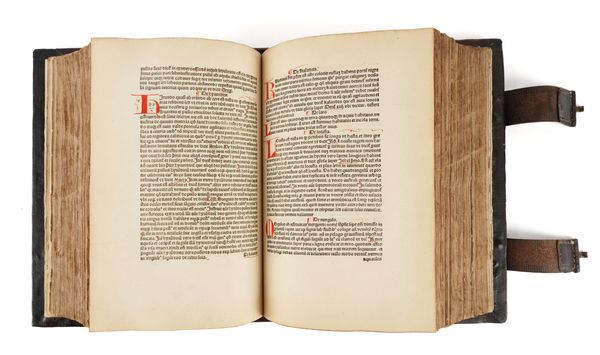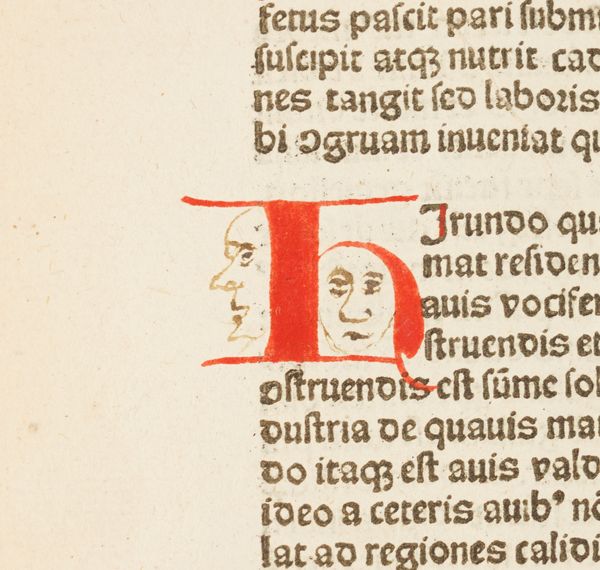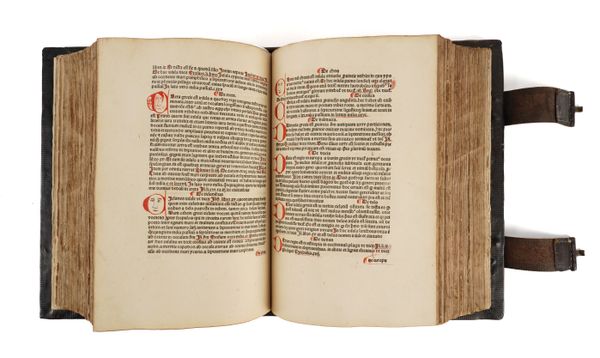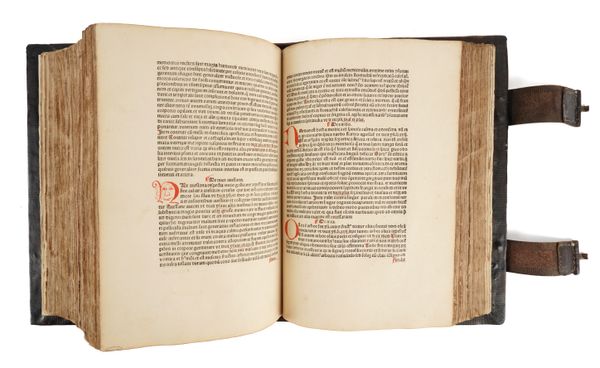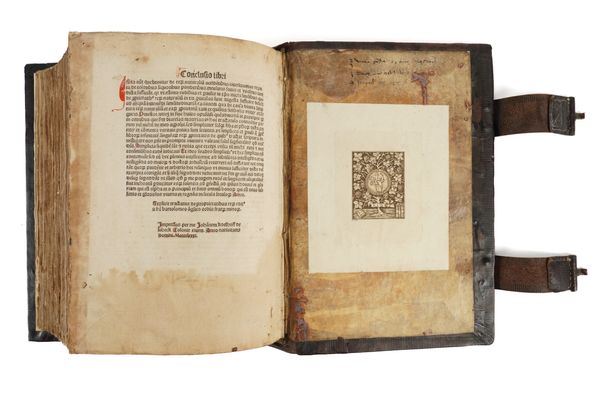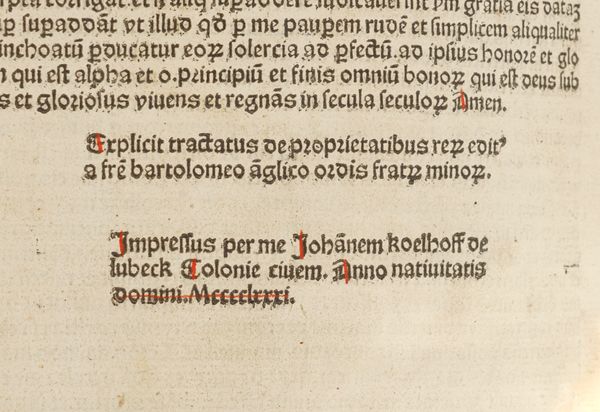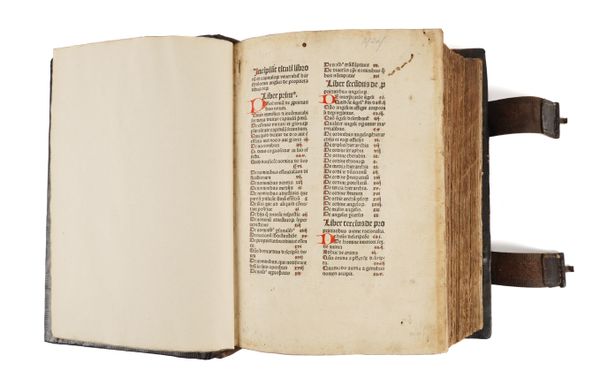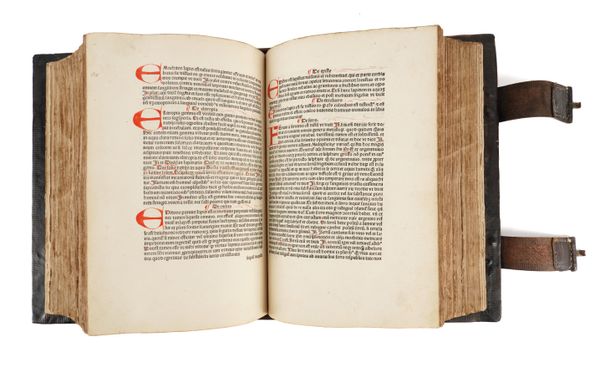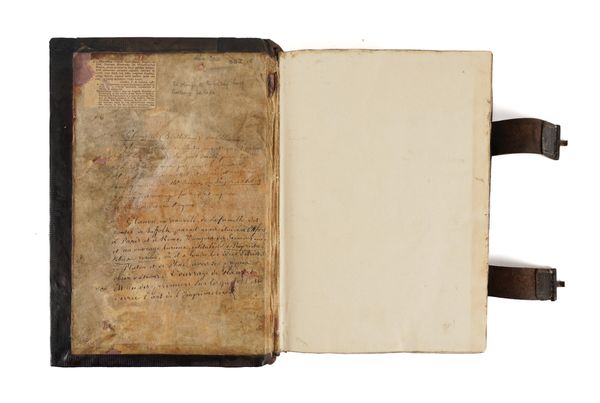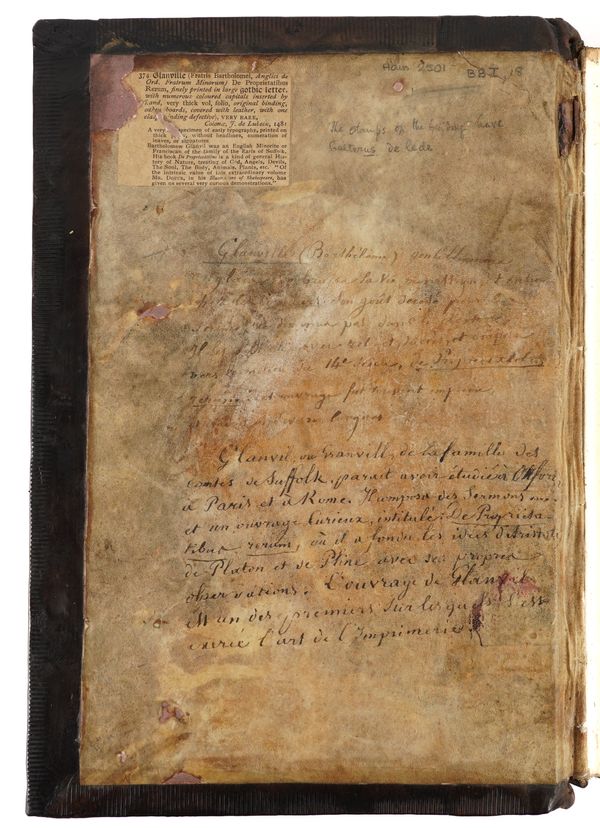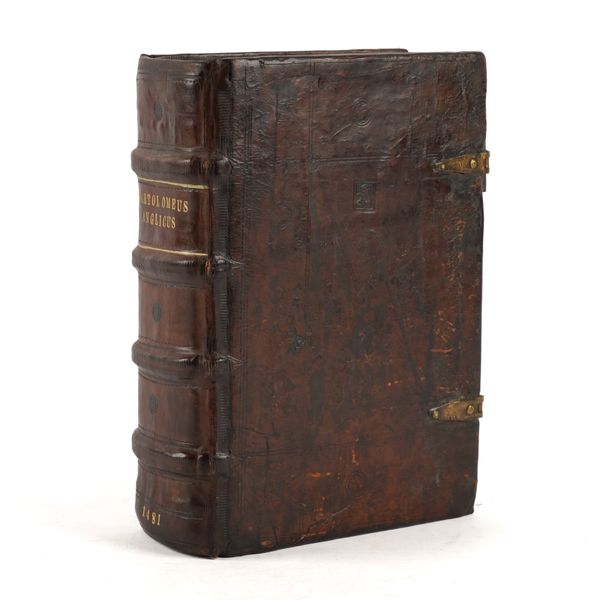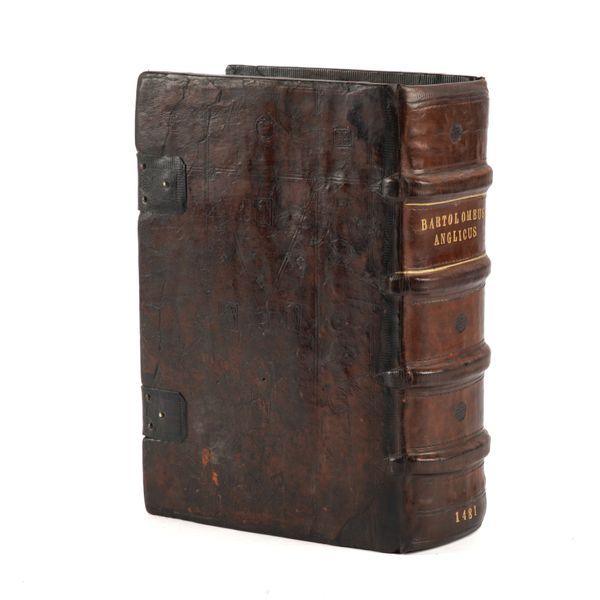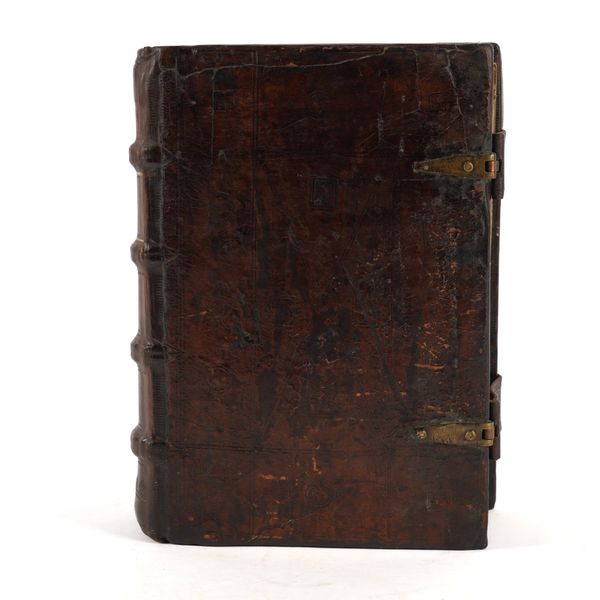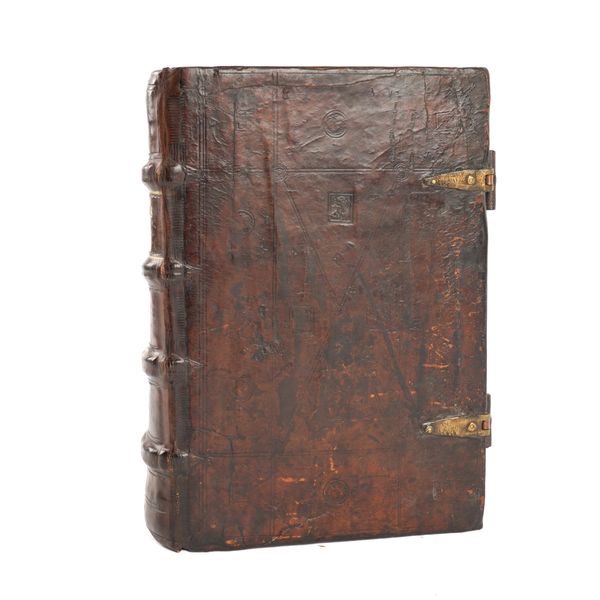Buyers Premium 25% + VAT | VAT is not applicable on bound books
BARTHOLOMAEUS ANGLICUS (c.1203-72). De proprietatibus rerum, Cologne, 1481, folio, 456 leaves, contemporary pen flourishes in red and grey ink to initials on two pages incorporating drawings of hares, old calf. Provenance: John Yudkin (bookplate). RARE.
| Estimate: | £3,000 - £5,000 |
| Hammer price: | £14,000 |
BARTHOLOMAEUS ANGLICUS or BARTHOLOMAEUS DE GLANVILLE [with many variants] (c.1203-72). De proprietatibus rerum. [Colophon:] Cologne: "Impressus per me Johanem koelhoff de lubeck", 1481. Chancery folio (287 x 205mm). 456 leaves of text including 10 leaves of "contents" at the front, text in Latin printed on thick paper with wide margins, large Gothic letter, with a large hand-painted initial in red and blue on the first page of the text, further embellished in a contemporary hand, as with other initials [see note below], initials hand-painted in red, rubricated throughout, without running titles, pagination or signatures [as issued] (lacks the blank leaves at the front and end, but later blanks inserted at the front, lacks all [i.e. blanks and endpapers] at the end after the colophon leaf headed "Conclusio libri", some worming at margins occasionally touching letters, a few marginal tears without loss, blank corner of a few leaves torn away without loss, two corners of one leaf repaired at margins without loss, a few light mainly marginal stains, larger stain to the lower portion of the last few leaves, a few leaves lightly browned). Contemporary calf decorated in blind over wooden boards, old engraved metal fitments with two later leather clasps (rebacked in old style, rubbed and scuffed, some repairs, later endpapers at the front). Provenance: From the Collection of Professor John Yudkin (modern bookplate; please see the note at the end of this description); copious 18th/19th-century French annotation to the front pastedown, mainly biographical information relating to the author; a later pencil note on the front pastedown stating, "The stamps on the binding [?]are [those of] Galterus de Lede" [whom we have been unable to identify]; old bookseller's description laid down on the front pastedown; some sparse contemporary annotation to the text; old annotation to rear pastedown; "A.L.S." (initials on later armorial bookplate on the rear pastedown with the motto: "Beatus homo quem tu erudieris domine"). The first printed encyclopedia to be written by an Englishman, although not printed in England and in the English language until Wynkyn de Worde's edition of c.1495. An unusual feature of this copy are the contemporary foliate pen flourishes which extend from some initials into the margins, and, on two pages, incorporate delightfully naturalistic drawings of hares, oak leaves and acorns, the kind of seemingly arbitrary scribe's 'doodles' which sometimes adorn the margins of Medieval manuscripts. Several initials are also decorated in the same hand, with a few incorporating human faces. "A condensed encyclopedia of what was then understood by natural science. The work was probably written about the middle of the 13th century. It was one of the most widely read scientific works of the Middle Ages" (Garrison & Morton). "From 1460, when Gutenberg printed the Catholicon of the thirteenth-century friar, Johannes Balbus of Genoa, encyclopedias have remained one of the most popular productions of the printing press: profitable to printers, publishers and booksellers and desired by the reading public wishing for comprehensive information on the range of human knowledge available at any given time. Before 1500, in addition to the Catholicon ... at least three other encyclopedias appeared in print, and the fact that their first editions were brought out virtually simultaneously by three different printers shows the widespread interest in this kind of book as well as the fierce spirit of competition within the printing trade. In 1472 the unknown Cologne printer, in whose shop William Caxton learned printing, published De Proprietatibus Rerum by the thirteenth-century English Franciscan, Bartholomaeus de Glanville. After two and a half centuries this encyclopedia was still a standard work used at all cisalpine universities, as is shown by its frequent reissue (Nuremberg, Anton Koberger, 1483; Haarlem, Bellaert, 1485; Westminster, Wynkyn de Worde, 1495 [the first edition in English translated by John of Trevisa])" (PMM, whose list of editions is not exhaustive and does not include the present Cologne edition). "Bartholomew [i.e. Bartholomaeus] not infrequently alludes to contemporary matters or describes daily life without mentioning any authorities, and his amusing accounts of such animals as cats and dogs, or boys and girls, or his instructions how to set a table and give a dinner, are almost entirely his own and show considerable power of observation and dry humour ... He is manifestly actuated by a scientific interest in present facts and phenomena. In the second book on the properties of angels is also discussed the nature of demons ... In discussing the disease of melancholia Bartholomew tells of a noble[man] whom he knew, who imagined that he was a cat and insisted upon sleeping under the bed, in order to watch the mouse holes ... In a chapter on dreams Bartholomew declares they are sometimes true and sometimes false ... Moreover, the meaning of some dreams is evident at once; others require interpretation ... Bartholomew's seventh book is medical, treating of infirmities in seventy chapters" (Thorndike). See further information regarding the author, and the present work, including a comparison of early manuscript sources, in DNB (listed under "GLANVILLE, Bartholomew"). ISTC ib00133000; BMC I, 223b; cf. Garrison & Morton 91 (citing the Basel edition of c.1470); Goff Incunabula in American Libraries B130; Hain Repertorium bibliographicum 2501; Klebs Incunabula scientifica 149.4; cf. PMM 9 (citing Isidore de Seville's Etymologie (1472), but the extract above is relevant to the present work); Polain Catalogue des Livres Imprimé au 15e Siècle 499; Proctor Index 1048; Thorndike History of Magic and Experimental Science pp.406-13. RARE.
Professor John Yudkin (1910-95) was an internationally recognised pioneer in the science of nutrition and the founding Professor of the Department of Nutrition at Queen Elizabeth College, London. From the 1960s onwards he formed one of the first and finest private antiquarian libraries devoted to diet and dietary illness. The main portion of this collection was included in a dedicated sale at Christie's South Kensington on 22 March 1996. At the same time, other books were donated to the Hebrew University of Jerusalem or to fill gaps in the holdings of the British Library. A third part - here offered for sale for the first time - includes books on scurvy, rickets and pellagra, in addition to two incunables, with the provenance indicated in each description. These comprise lots 322, 353, 355, 357, 370, 371, 381, 383, 395, 399 and 404.
